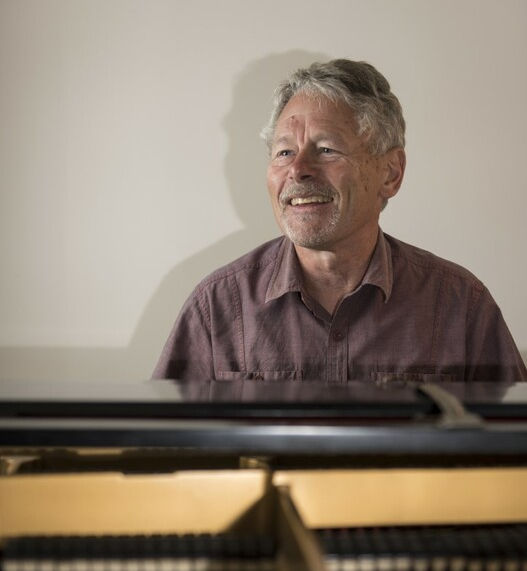Richard Mapp (2020)
Richard made his solo debut at the age of 12 with the Christchurch Civic Orchestra, playing Mendelssohn's Piano Concerto No. 1. He studied with Ernest Empson, a Godowsky pupil, and later at the University of Otago with Maurice Till, also a student of Empson. Richard studied with Gordon Green at the Royal Academy of Music in London, where he later held a teaching fellowship. He also received coachings from William Pleeth (cellist and teacher of Jacqueline Du Pre) and the Beaux Arts Trio.After a successful debut at Wigmore Hall, Richard held solo and recital engagements in Europe, Scandinavia and North America. He has performed extensively across the United Kingdom and Australasia, and in Germany, Sweden, Finland, Italy, Malta, and Canada. Richard has recorded six CDs and his recordings are frequently heard on RNZ Concert.
After 16 years of performing and teaching overseas, Richard returned to New Zealand in 1991 and has since co-founded the Bay of Islands Arts Festival, toured for Chamber Music New Zealand, and performed as a concerto soloist with all major orchestras including the New Zealand Symphony Orchestra. He has appeared as chamber music partner with many leading musicians in the country, including the New Zealand String Quartet.
Richard has taught piano at the University of Waikato, the University of Canterbury, and the Massey Conservatorium of Music in Wellington. He currently teaches piano at Te Kōkī New Zealand School of Music at Victoria University of Wellington and the Nelson Centre of Musical Arts.
Richard’s programme will include pieces by Haydn, Schumann, Liszt and Beethoven.
Richard Mapp - Review
View Programme Notes
Sponsored by TrustPower
Review of Richard Mapp:
Tauranga Musica brought its 2020 concert season to a fitting and most satisfying close on Sunday afternoon with New Zealand pianist, Richard Mapp, delivering an absolutely first-class concert of works by Haydn, Schumann, Liszt and Beethoven.
Mapp began his recital with Haydn’s F Minor Variations, dedicated to the extremely talented Viennese pianist, Barbara Ployer (for whom Mozart also composed). The Variations follow an unusual form, alternating between 2 themes, one major and one minor. Mapp delivered with beautiful precision and with an intimate understanding of Haydn’s phrasing; which was only enhanced by his evenly articulated trills and wonderfully fluid arpeggios. Mapp’s sensitive touch was able to extract extreme anguish at times, giving credence to the hypothesis that Haydn composed this work upon the death of a friend/colleague. Although some have theorised the grief contained therein, and so succinctly drawn out by Mapp, was caused by the death of Mozart, evidence strongly suggests it was in fact upon his learning of the death of a beloved and much admired friend, Maria Anna von Genzinger. Their considerable correspondence spanning many years shows a relationship of extreme mutual respect and deep fondness.
A highlight of the afternoon’s programme was Mapp’s performance of Robert Schumann’s Fantasie in C Major, Op. 17. A sonata in all but name, and undoubtedly Schumann’s greatest work for piano. Mapp never failed to disappoint for a solitary moment in the gut-wrenching first movement. Intense tension and tumultuous angst was all laid bare in Mapp’s powerful delivery. A disturbingly sensual theme midway through rivals Wagner’s famed Liebestod from Tristan and Isolde. The second movement, a heroic march, gives the work a much-needed sense of hope and optimism and Mapp played with real power. The final movement is in many ways dream-like, the two lover’s at last find their intimacy. Mapp perfectly paints the musical portrait of Schumann’s troubled courtship and ultimate victory in winning the hand of his beloved Clara throughout this work. It is a profound personal and musical journey. Mapp’s passion was exhausting and exhilarating.
Liszt’s Benediction de Dieu dans la Solitude began the second half. As is to be expected with Liszt’s, the music was taxing. Mapp’s technical skill and ability were on full display and truly beyond reproach. He showed an excellent understanding and interpretation of the physical demands of Liszt’s dynamic structures with its endless left hand arpeggios and aggravating right hand octaves. Typical of Liszt, this work is wonderfully showy especially for a work inspired by religious poetry. One wonders whose attention he is really trying to catch with all the manual acrobatics, God’s or his adoring fans?
To conclude, Mapp delivered a deeply expressive performance of Beethoven’s A-Flat Major Sonata (No. 31). The initial theme was conveyed with great care and tender delicacy. Mapp brought excellent dynamic contrast to Beethoven’s chaotic and frustrated Allegro movement before delivering a truly tragic Adagio. The final movement begins with a moment of profound agony and is haunted by the tolling bell reminding both composer and listener of their ultimate and inevitable mortality.
Richard Mapp is truly a New Zealand treasure. While there are plenty of players about of arguably comparable skill, his unique talents run much deeper. He is a player of extraordinary passion. His touch and his sensitivity but reserved presence makes him a conduit of musical emotion. The atmosphere he creates in a performance space is palpable. He is one of a kind.
Chalium Poppy
Previous concert
